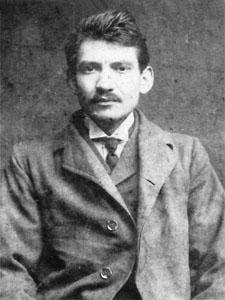Marius Jacob
Marius Jacob (born September 29, 1879 in Marseille as Alexandre Jacob ; † August 28, 1954 in Reuilly (Indre) ) was a French anarchist and folk hero. The ingenious burglar had a keen sense of humor and could be extremely generous to his victims. He served the writer Maurice Leblanc as a model for his fictional master thief Arsène Lupine .
Life
Born in poor conditions, Jacob hired himself as a cabin boy when he was twelve. In Sydney he deserted. After a short time among pirates , whose business was too cruel for him, he returned to Marseille in 1897. He gave up the sea, but suffered all his life from attacks of fever, the pathogen he had contracted during this time.
Jacob worked as a typesetter and came into contact with anarchist circles. The anarchists were constantly threatened with prison and the guillotine . Jacob was sentenced to six months in prison in connection with an explosives attack. After that, he became an illegalist who stole from the rich to help the poor.
He first gained national attention in 1899 after he, as an alleged police superintendent and two accomplices, captured the contents of the evidence room of the Marseilles police. Arrested a little later, he escaped under the pretense of insanity.
By 1903 he had committed at least 150 break-ins and thefts, mostly with only a few accomplices, and his ideas and skills, humor and generosity amazed the public. Although Maurice Leblanc always denied this, Marius Jacob, among others, served him as a model for his master thief Arsène Lupine , whose stories he published from 1905.
In 1903, Jacob was arrested and sentenced to life in a penal colony in Cayenne after a shootout that killed a police officer . Seventeen attempts to escape failed. When the penal colony was lifted after the reports by Albert Londres , Jacob returned to Paris, where he served his sentence until 1927. After his health was restored, he worked first in the Printemps department store , then as a traveling salesman in the Loire Valley and Touraine .
In 1929 Jacob made the acquaintance of Louis Lecoin , who published the anarchist magazine "Le Libertaire". The two became friends, and Jacob wrote for the magazine. He stood up for conscientious objection and for Sacco and Vanzetti .
In 1936 he supported the Republicans against Franco in Spain , but soon returned to France because of the hopeless situation. In 1939 he bought a small house in Reuilly. During the Second World War , he gave shelter to resistance fighters .
On August 28, 1954, Marius Jacob killed his dog Négro and himself from an overdose of morphine . He left the message: “Linge lessivé, rincé, séché, mais pas repassé. J'ai la cosse. Excusez. Vous trouverez deux liters de rosé à côté de la paneterie. À votre santé. " (" Laundry washed, wrung out, dried, but not ironed. I'm tired of it. Sorry. You will find two liters of rosé next to the bread basket. For good. ")
literature
- Michael Halfbrodt: Alexandre-Marius Jacob: The life story of an anarchist thief . Moers: Syndicat A anarcho-syndicalist media sales, 1994
- Alexandre Jacob: Travailleurs de la nuit . L'Insomniaque, 1999, ISBN 2-908744-50-3 (French)
- Alexandre Jacob: Extermination à la française - lettres de prison et du bagne à sa mère (letters from prison and the penal colony to his mother). L'Insomniaque, 2000 (French)
- William Caruchet: Marius Jacob / biography . Nouvelles Éd. Séguier, 2003, ISBN 2-840490-09-9 (French)
- Alain Sergent: Un Anarchist de la Belle Époque: Alexandre Marius Jacob . Libertaires, 2005, ISBN 2-914980-17-5 (French)
- Bernard Thomas: Les Vies d'Alexandre Jacob (1879–1954), mousse, voleur, anarchiste, bagnard… . Fayard-Mazarine, 1998, ISBN 2-863742-93-0 (French)
- Jean-Marc Delpech: Alexandre Jacob l'honnête cambrioleur . Atelier de création libertaire, 2008, ISBN 978-2-35104-022-5
Web links
- Website about Marius Jacob
- Comic about Marius Jacob
- Report by Alexis Danan
- The blog of Alexandre Jacob, the honorable thief
- Entry on Marius Jacob in the Lexicon of Anarchy
| personal data | |
|---|---|
| SURNAME | Jacob, Marius |
| ALTERNATIVE NAMES | Jacob, Alexandre (maiden name) |
| BRIEF DESCRIPTION | French anarchist and folk hero |
| DATE OF BIRTH | September 29, 1879 |
| PLACE OF BIRTH | Marseille |
| DATE OF DEATH | August 28, 1954 |
| Place of death | Reuilly (Indre) |
